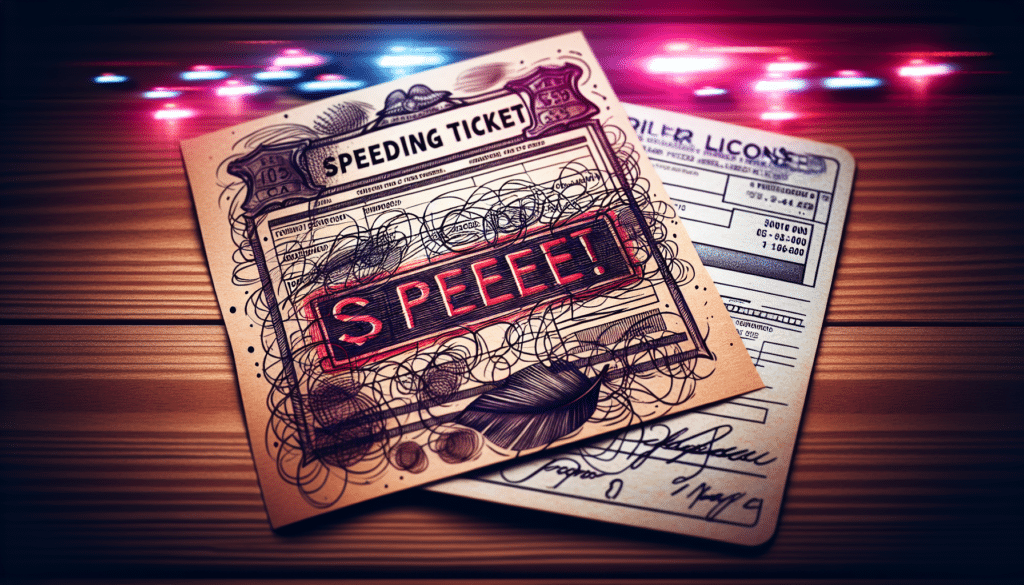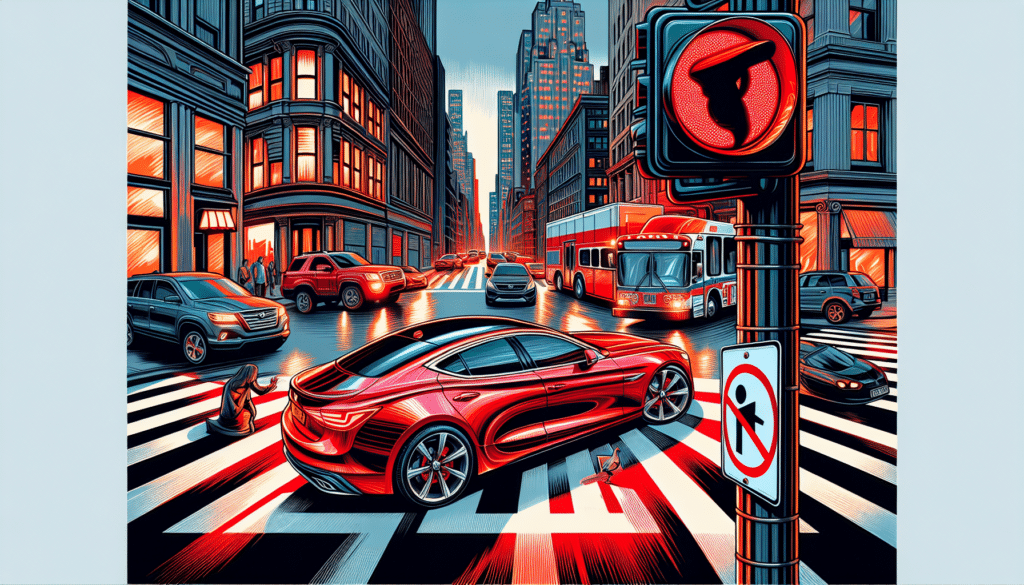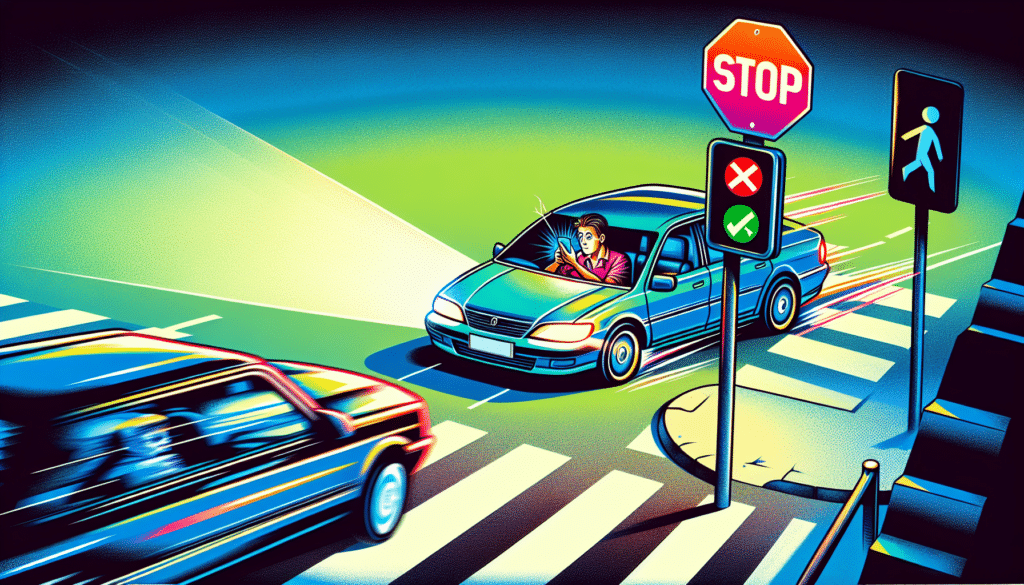Speeding is the most popular traffic ticket issued in California. In this article, we’ll explore why it’s so common, its consequences, and other frequent traffic violations.
Key Takeaways
Speeding is the most common traffic violation in California, driven by the high-paced culture and congested traffic in urban areas, and carries significant repercussions such as fines, points on driving records, and increased insurance premiums.
Demographic factors like age, gender, and income levels significantly influence the likelihood of receiving traffic tickets, with younger drivers, men, and lower-income individuals being disproportionately affected.
Law enforcement practices and strategies, such as pretext stops and the use of technology like speed cameras, greatly impact ticket issuance, with ongoing efforts to balance road safety and fair, unbiased policing.
Speeding Violations in California

Speeding tickets are the most common traffic violation in California, a fact that shouldn’t come as a surprise given the state’s culture of fast-paced living and heavy traffic in urban areas. California drivers often find themselves caught speeding amidst the hustle and bustle of cities like Los Angeles and San Francisco, where the pressure to keep up with the flow of traffic can be overwhelming. Speed limits are frequently exceeded, not out of malicious intent but often as a byproduct of trying to navigate the congested roadways efficiently.
The impact of receiving a speeding ticket extends far beyond the initial fine. It can affect your driving privileges, insurance premiums, and even your ability to drive legally if too many points accumulate on your driving record. Grasping the full range of repercussions is essential for all California drivers.
Impact on Driving Record
A speeding ticket in California is more than just a fine; it’s a mark on your driving record that can have lasting repercussions. Each speeding violation adds points to your driving record, which can stay there for three years. Accumulating too many points can lead to increased insurance premiums and potentially even a suspension of your driver’s license.
Keeping a clean driving record is a serious concern for drivers in California. Points from speeding tickets and other traffic violations can pile up quickly, affecting your driving privileges and making you a target for further traffic stops. The California DMV closely monitors driving records, and multiple infractions can lead to harsher penalties and the need to attend traffic school or face license suspension.
Fines and Penalties
The fiscal weight of a speeding ticket in California can be substantial. The base fine for speeding tickets ranges from $35 to $100, but additional fees and penalties can quickly escalate the total cost. Depending on how much the speed limit was exceeded, the total cost of a speeding ticket can range from $238 to $490.
If you have a prior traffic conviction within the last 36 months, the fines can increase even further. These additional fines and penalties underscore the importance for drivers to obey traffic laws and refrain from speeding. The cost isn’t just monetary; the long-term impact on your driving record and insurance premiums can be even more costly.
Insurance Premiums
Receiving a speeding ticket can have a dramatic effect on your auto insurance rates. If you receive a speeding ticket in California, it could lead to an increase of approximately 40% in your insurance premiums. This can have a significant impact on your overall insurance costs. This increase translates to an average annual cost rise of $1,104, pushing the total average cost to $3,790 per year for car insurance.
Multiple speeding tickets can potentially double these costs, thus emphasizing the importance of attending traffic school and lowering points on your driving record to dodge these financial burdens. Attending a traffic school course can help mitigate the impact on your insurance premiums, making it a worthwhile investment for many drivers.
Other Common Traffic Violations

While speeding tickets are the most common, California drivers often face a variety of other traffic violations. Some common examples of traffic violations are running red lights and making illegal turns. In addition, distracted driving is also a serious offense. Each of these violations carries its own set of fines and penalties, further complicating the landscape of traffic tickets in California.
Familiarizing oneself with these common traffic violations, including reckless driving, can assist drivers in avoiding them and upholding a clean driving record. From aggressive driving behaviors like tailgating and unsafe lane changes to failing to signal before a turn, these infractions can lead to significant consequences if not addressed promptly.
Running Red Lights

Running red lights is a serious offense in California, with fines ranging from $35 to over $100, plus additional court costs and fees. Millennials are particularly prone to this violation, often leading to hefty fines and points added to their driving records. A red-light ticket can cost around $500 if convicted, making it one of the more expensive common traffic violations.
Beyond the financial cost, a violation for running a red light adds one point to your DMV record, which can contribute to a negligent operator license suspension if points accumulate. This emphasizes the need to comply with traffic signals and refrain from running red lights.
Illegal Turns
Illegal turns are another frequent traffic violation in California. These often involve ignoring road signs that direct traffic flow, such as no U-turn signs. Making an illegal turn at a red light can result in a base fine of $35, but additional penalties can apply based on the specific circumstances of the violation.
These violations not only lead to fines but also add points to your driving record, which can have long-term implications for your driving privileges and insurance premiums. Acknowledging and obeying traffic signs can assist in avoiding these expensive errors.
Distracted Driving

Distracted driving is a growing concern in California, with improper cell phone use being one of the leading causes of these violations. Using a cell phone without a hands-free setup can result in a ticket and points on your driving record. Failure to yield to pedestrians is another common form of distracted driving, often leading to accidents and severe penalties.
The consequences of distracted driving extend beyond fines and points; they can also lead to increased insurance premiums and even more severe legal repercussions if accidents occur. Maintaining focus on the road and steering clear of distractions is vital for safe driving.
Demographics and Traffic Tickets
Demographics play a significant role in the likelihood of receiving traffic tickets in California. Factors such as age, gender, and income levels can influence how often drivers are stopped and cited for violations. Studies have shown that certain demographic groups are disproportionately affected by traffic stops and tickets.
Comprehending these disparities is essential to tackle the wider issues of fairness and equality in traffic enforcement. By examining the impact of demographics, we can gain a deeper insight into the patterns and practices that shape traffic ticket issuance in California.
Age Groups
Traffic violations are significantly influenced by age. Here are some key findings:
Younger drivers are more prone to committing traffic violations compared to older, more experienced drivers.
Drivers between the ages of 50 and 64 report the highest likelihood of having at least one speeding ticket in their driving history.
Novice older drivers tend to have a higher rate of traffic violations compared to their younger counterparts.
Interestingly, Millennials, aged 27 to 42, are identified as the most dangerous drivers, while Baby Boomers, aged 60 to 77, are considered the safest. Young drivers are also more likely to be stopped for moving violations, highlighting the need for targeted education and enforcement measures.
Gender Disparities
Gender disparities in traffic ticket issuance are notable, with men statistically more likely to receive tickets than women across all age groups. Men are also more likely to be stopped for traffic violations, particularly for speeding and DUI offenses.
Male drivers receive at least 50% more speeding tickets than their female counterparts, and this gap widens with age. For drivers over 55, men are ticketed for speeding 200% more often than women, underscoring significant gender differences in driving behavior and enforcement.
Income Levels
Income levels also influence the likelihood and impact of traffic tickets. Drivers from lower-income neighborhoods face higher rates of traffic stops and citations. The financial burden of traffic fines disproportionately impacts low-income individuals, often leading to additional penalties for late payments.
Unpaid traffic fines can accumulate into significant debt for low-income drivers, exacerbating financial hardships and contributing to a cycle of penalties and legal issues. Addressing these disparities is essential for creating a fairer traffic enforcement system.
Financial Implications of Traffic Tickets
The financial implications of traffic tickets in California are far-reaching, affecting drivers’ wallets and long-term financial stability. The state generates an estimated $500 million in annual revenue from traffic tickets, highlighting the significant economic impact of these violations.
Disregarding a traffic ticket can result in extra fines and marks on the driver’s DMV record, emphasizing the importance of dealing with tickets promptly and effectively. Understanding the financial implications can help drivers make informed decisions and avoid unnecessary costs.
Long-Term Costs
If you don’t pay your traffic fines on time, you may face additional penalties, such as a civil assessment fee being added to the original fine. In some cases, the matter may also be taken over by a collections agency. These long-term costs can accumulate quickly, leading to significant financial burdens.
Dealing with traffic tickets swiftly and understanding the possible long-term costs can assist drivers in evading these extra penalties and preserving financial stability. Staying informed and proactive in handling traffic violations is of utmost importance.
Payment Options
California courts offer various payment options for traffic fines, including:
the possibility of reduced fines
extended payment periods for those facing financial hardship
the option to request more time to pay fines
the option to perform community service as an alternative.
Understanding and utilizing these payment options can help mitigate the financial impact of traffic tickets, especially for lower-income individuals. Being aware of the options available can make managing traffic fines more manageable and less stressful.
Contesting Tickets
Contesting a traffic ticket in California can be done through a traffic court trial or trial by written declaration, potentially avoiding fines and other penalties. Pleading not guilty and requesting a trial involves appearing in court and presenting a defense.
Hiring a traffic ticket attorney can increase the chances of a ‘not guilty’ verdict, helping drivers avoid the financial and legal repercussions of a conviction. Understanding the process of contesting tickets can empower drivers to take control of their situation and seek fair outcomes.
Navigating the Traffic Ticket Process
Navigating the traffic ticket process in California involves several steps, including paying fines, requesting extensions, and attending traffic school. After receiving a ticket, it’s crucial to understand the details of the violation and the available options for resolution.
Neglecting a traffic ticket can result in extra fines and marks on the driving record, thus immediate action is vital. Understanding the process and knowing your options can help you manage traffic tickets effectively.
Paying Your Fine
Paying a traffic fine can be done in various ways, including:
Online
By mail
In person
Over the phone
It’s important to follow the specific payment instructions provided by the court listed on your ticket.
Understanding the payment process and adhering to deadlines can help avoid additional penalties and keep your driving record clean. Prompt payment is often the best bet for managing traffic fines effectively.
Requesting an Extension
If you need more time to pay your fine or prepare your case, you can request an extension by contacting the court listed on your ticket. Extensions can provide additional time to gather necessary information or funds, helping to manage the financial burden of traffic fines.
Extensions can be requested online or by contacting the court’s office, providing flexibility for drivers facing financial or scheduling challenges. Knowing how to request an extension can help manage the stress and financial impact of traffic tickets.
Attending Traffic School
Attending traffic school can significantly benefit drivers by reducing points on their driving record and preventing increases in insurance premiums. You are eligible for traffic school if you have a valid driver’s license and have not attended traffic school in the past 18 months. Additionally, you must have received a citation for a non-commercial vehicle.
Completing a state-approved traffic school course within the specified timeframe ensures that the point from the traffic violation won’t be added to your record. This can help maintain lower insurance premiums and keep your driving record clean, making it a valuable option for many drivers.
Law Enforcement Practices and Traffic Tickets
Law enforcement practices significantly influence the issuance of traffic tickets in California. The approaches of officers differ by location and are shaped by factors like shifts in policies and staffing levels. For instance, the San Francisco Police Commission has restricted officers’ authority to conduct traffic stops for minor infringements to address concerns about disproportionate targeting of individuals of color. Similarly, the Los Angeles Police Department has adjusted its traffic enforcement policies, leading to fewer stops for minor violations but a slight increase in discovered contraband.
Such modifications mirror wider trends in traffic enforcement strategies that strive to strike a balance between road safety and equitable, unbiased policing. Understanding these practices can help drivers navigate traffic stops more effectively and advocate for fair treatment.
Pretext Stops

Pretext stops, where officers stop drivers for minor equipment violations, are a controversial practice in California. These stops often lead to more intrusive actions and disproportionately affect Black and Latino drivers. Proposals have been made to end pretext stops, particularly those for minor equipment violations, to reduce the associated fines and fees.
Male drivers are more frequently subjected to searches during these stops compared to female drivers. Comprehending the ramifications of pretext stops can enable drivers to be more cognizant of their rights and the potential prejudices in traffic enforcement.
Traffic Enforcement Strategies
Traffic enforcement strategies in California include targeted patrols, speed cameras, and policy changes aimed at reducing bias in stops. For example, San Francisco plans to implement automated speed cameras on its busiest streets to assist law enforcement and generate revenue. These measures are part of broader traffic calming efforts that include speed cushioning and road narrowing to improve safety.
These strategies strive to bolster road safety while guaranteeing just enforcement of traffic laws. By understanding these approaches, drivers can better navigate the complexities of traffic enforcement in California.
Technology in Traffic Enforcement
Technology holds a key position in contemporary traffic enforcement, where tools such as speed cameras boost efficiency and precision. Speed cameras are used to detect and document speeding violations, capturing license plate numbers and speed details to ensure accurate ticket issuance.
The use of technology in traffic enforcement leads to more consistent and unbiased ticket issuance, potentially influencing driver behavior over time. Understanding the role of technology can help drivers stay informed about enforcement methods and adapt their driving habits accordingly.
Summary
Navigating the world of traffic tickets in California can be challenging, but understanding the common violations, the impact on your driving record, and the financial implications can help you make informed decisions. Speeding tickets, while the most common, are just one of many violations that drivers need to be aware of. Other frequent violations like running red lights, illegal turns, and distracted driving also carry significant consequences.
By understanding the demographics of traffic tickets, the role of law enforcement practices, and the benefits of attending traffic school, drivers can better manage their driving records and avoid unnecessary penalties. Staying informed and proactive is key to maintaining a clean driving record and minimizing the financial impact of traffic violations. Drive safely and responsibly to ensure a smoother journey on California’s roads.
Frequently Asked Questions
What is the most common traffic violation in California?
The most common traffic violation in California is speeding, which is often linked to the state’s fast-paced lifestyle and crowded urban areas.
How can a speeding ticket impact my driving record?
A speeding ticket can add points to your driving record, leading to increased insurance premiums and potential license suspension. Be mindful of your driving habits to maintain a clean record.
What are the financial implications of a speeding ticket in California?
Receiving a speeding ticket in California can result in a base fine ranging from $35 to $100, with additional fees and penalties increasing the total cost to between $238 and $490. Additionally, it could increase your auto insurance rates by about 40%.
How can I contest a traffic ticket in California?
To contest a traffic ticket in California, you can plead not guilty and request a trial, either in court or by written declaration. Consider hiring a traffic ticket attorney to increase the chances of a favorable outcome.
What are the benefits of attending traffic school after receiving a ticket?
Attending traffic school can help reduce points on your driving record and prevent increases in insurance premiums, which is beneficial after receiving a ticket.




